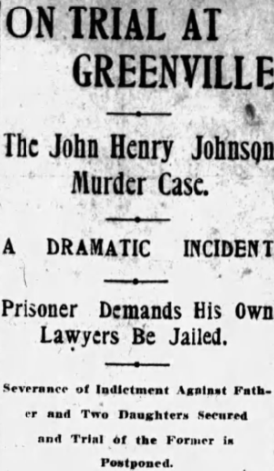John Henry Johnson Trial
May 1, 2023
5 mins read

Divine Delusion and Deadly Devotion: The Troubling Trial of John Henry Johnson and His Daughters
On February 15th 1905, a complex and emotionally charged trial took place in Greenville, Alabama, involving John Henry Johnson and his daughters, Katie and Maggie. The case centered around the murder of Special Deputy George Bryan, who had been killed during an attempt to arrest Johnson for the arson of a local church.
Background
John Henry Johnson was a prominent farmer in Butler County, Alabama, known for his contributions to the community, particularly as the builder of Mt. Olivet Church. The church served the local Baptist congregation and was led by Johnson’s brother-in-law, Reverend W H Joyner. Unfortunately, tensions arose within the community, and a member of Johnson’s family became unwelcome in the church, leading to further conflict.
Johnson had a history of mental illness, and his erratic behavior led to his commitment to the State Insane Asylum in Tuscaloosa for twenty-three months. After being released on a six-month probationary period, he returned to his community, where it was said that his violent religious mania escalated. Following his release, In June 1904, Mt. Olivet Church was burned to the ground, and Johnson claimed responsibility. He left a note at the scene which read:
“I am directed by God Almighty to burn this church. I gave and I have burned away. I am responsible for the sins of the world. Done this day by “John Henry Johnson, “I Are God.”
The Confrontation and Tragic Outcome
The tragic sequence of events leading to the murder of Deputy Sheriff George Bryan began when John Henry Johnson, in the midst of plowing his fields on horseback, was confronted by George Bryan and his brother, Oliver. The Bryans were there to serve an arrest warrant on Johnson for the arson of Mt. Olivet Church. Johnson, unwilling to cooperate, invited the officers to follow him to his house.
At the residence, tensions escalated quickly. Johnson, wielding a long and deadly knife he had fashioned himself, attempted to attack the officers. The Bryan brothers managed to seize Johnson’s wrists, but the struggle took a turn for the worse when one of Johnson’s daughters intervened. Rushing to her father’s aid, she struck George Bryan with a piece of lumber.
With the officers momentarily stunned, Johnson managed to free himself and grabbed a pistol from his shirt. He fired two shots, hitting George Bryan in the stomach. The wounds proved to be fatal, and the deputy died the following day.
The Aftermath and Legal Struggles
In the aftermath of the murder, John Henry Johnson and his daughters, Katie and Maggie, found themselves facing the full force of the law. The sisters were accused of aiding their father in the murder. At their habeas corpus proceedings, their defense argued that the daughters were justified in defending their father given his alleged insanity. However, the Supreme Court of Alabama dismissed this contention and the sisters’ application for a writ of habeas corpus.
The Trial and Protest
During the trial, the tension in the courtroom was palpable as Johnson’s defense team argued that his violent religious mania and history of mental illness should save him from the death penalty. However, a technical lapse in the deposition of a key expert witness in the form of a single missing signature led Johnson’s attorneys to request a continuance, which would delay proceedings until the next term of the circuit court of Butler County, Alabama, much to their client’s dismay.
Johnson, a physically imposing figure with a fiery gaze, could no longer contain his frustration. Balancing on his one sound leg, with his other foot maimed and barely touching the floor, he sprang up in protest. He was persuaded to sit back down, but his anger continued to simmer. The judge ruled that the case should be postponed. Unable to remain seated, Johnson rose once more, passionately protesting the continuance. Addressing the court with determination, Johnson gestured to his own two attorneys as he declared “If you insist on a continuance I insist that you make these two men who are responsible for it take my place in jail and set me at liberty.”
This time, the courtroom fell into a heavy, painful silence as his outburst echoed through the chamber. Despite Johnson’s multiple impassioned protests, the ruling stood. The decision further prolonged the ordeal for Johnson and his daughters, who had already spent months in jail awaiting their trial.
My relationship to John Henry Johnson
John Henry Johnson 1852-1936 was my 2nd Great-Granduncle. The connection goes from:
Father of John Henry Johnson
⬇️
Warren Aaron Johnson 1869-1955
Son of Aaron Noel Johnson
⬇️
Mary Bertha "Bert" Johnson 1897-1985
Daughter of Warren Aaron Johnson
⬇️
Keith Burtram Graham 1929-1993
Son of Mary Bertha "Bert" Johnson
⬇️
Robert Keith Graham 1957-
Son of Keith Burtram Graham
⬇️
Patrick Robert Graham
I am the son of Robert Keith Graham
Links
- Transcription of Newspaper Article
- My clip of the original article “On Trial At Greenville” published in The Montgomery Advertiser 15 Feb 1905 and hosted on newspapers.com
- My collection of clips tagged with John Henry Johnson at newspapers.com